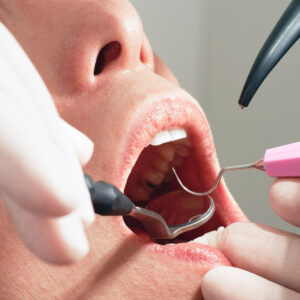
For most people, brushing and flushing at home simply isn’t enough to keep your mouth free of problems for life. Visiting a dentist at least twice a year for dental checkups, cleanings, and other procedures is integral to keeping your mouth healthy. Dentists are doctors who have been specially trained to identify and treat problems in the mouth, many of which are subtle at first, but can cause major problems to your mouth and overall health if left untreated.
The Importance of Regular Dental Visits
Without routine dental checkups, bacteria, and plaque (a hard, acidic film that corrodes teeth) buildup in areas near the gumline or in-between the fissures in your teeth and decay the hard enamel that coats your tooth. Holes and weaknesses in the enamel are called cavities and can only be treated by a procedure called a filling.
After a while, the enamel is eaten away, exposing the spongy inner material of your teeth (called the dentin) or even the nerve and blood vessels that keep the tooth alive. If the decay is advanced enough, the possibility of tooth loss, infection, and gum disease are all possible results. There are even studies that show bacteria from diseased gums can cause problems in other parts of the body—even creating a higher risk of heart disease. Visiting your family dentistry every six months is usually enough to keep your teeth and mouth in optimal health and avoid painful and expensive problems later.
What Happens During a Dental Checkup?
A regular dental checkup includes two parts: A thorough cleaning of your teeth, gums, and mouth (usually by a trained medical professional called a dental technician) and then a checkup by your dentist, who will inspect your mouth for signs of decaying or cracked teeth, infection of the gums or soft tissue, or other potential hazards to your oral health. If there are any affected areas, your dentist will prescribe treatment and perform procedures like cavity fillings or root canals to stop decay and retain the health of your teeth.
How Long Does a Dental Checkup Take?
The time for a regular dental checkup varies depending on several factors. If it’s been a while since you’ve last been in, it can take longer for a dental technician to fully clean the hardened tartar (called “plaque”) from the surfaces of your teeth. This is usually accomplished with a combination of scraping with a dentist’s tool, brushing with a high-powered pneumatic brush, and flossing with a simple piece of floss, or a floss pick. The time it takes to accomplish this depends on the amount of tartar and plaque present and is one of many reasons to go to the dentist often.
Once per year, your dentist may also want to perform dental x-ray imaging to check for problem areas that are invisible to the eye. Dental imaging is safe, and a crucial part of maintaining oral health. The actual imaging only takes a few minutes, but you should be aware and try to keep track of the last time you had it done. That way, you’ll know which of your two yearly visits will include this added time.
What To Do In Between Dental Visits
Dentists and dental technicians perform specialized cleanings with purpose-made dental tools, but most home tooth care products are more than capable of keeping your mouth healthy and decay free in-between visits. Start by establishing a good home dental hygiene routine based on your preferences and the requirements for your care as explained by your dentist. Use a soft-bristled brush and toothpaste from a dentist-recommended brand at least twice a day to clean the surfaces of your teeth and gums, and floss at least once per day to clear old pieces of food that could cause decay from between your teeth.
Investing in equipment like electric toothbrushes, Waterpiks, or mouthwashes with fluoride will all contribute to the long-term health of your teeth by more effectively removing plaque and buildup. Going to the dentist is an opportunity to talk about which health care options are best for you with a licensed professional who cares about the health of your smile. If you need to see a dentist, schedule an appointment with Spanish Springs Family Dentistry today!
